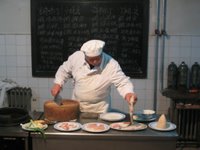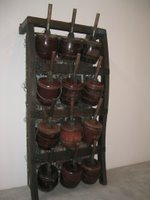Not much
local reaction to the Bush
visit apparent in the day to day. One conversation partner scans headlines and front pages at her local newstand everyday and claims Bush didn't make the cover of anything for sale over the last four days (except for a photo of him riding his bicycle). The well-regarded
Nanfang Zhoumo or
Southern Weekend comes out Thursday however, so she'll have a closer look then. It's not a subject that interests or enages most ordinary Chinese, she said, and none of her college-educated friends or family members are talking about the visit. I asked if the story might be inside. She said then it wasn't important enough to follow. She's hardly a spokesperson for "ordinary Chinese," but a China expert from Washington DC visiting Beijing this week had the same sense, hearing the same from his contacts in local academic and think tank circles and from his taxi drivers. They knew Bush was in town, but had no idea what he said and didn't see much of an impact.
At school, another student says he laughed or smiled when reading aloud in class an anti-Taiwan passage from one of his textbooks. His teacher asked whether the average American would identify with Taiwan or China. "Without thinking, I immediately said Taiwan," the student said. He went on to explain that since Taiwan was a democracy, most Americans probably would relate to that. The teacher looked surprised and replied that China too was a democracy. "But um, you don’t elect your leaders do you?" the student said, incredulous but trying to be polite. "But we have the People's Congress," the teacher insisted.
Another teacher makes the distinction between Japanese wartime aggression being inflicted externally and Mao, who while killing many Chinese, only did damage internally. I did not pursue this line of questioning. People revere him for stabilizing the country and everyone seems afraid of instability and willing to sacrifice pretty much anything to avoid it.
Too many cars, but the government wants to enourage GDP growth and doesn't want to alienate people who can afford to buy cars. Too much pollution, but closing more factories or raising gasoline prices would cause the poor to riot. "Zenme ban," (what's to be done?) or "Meiyou banfa," (no way out of the problem) locals often say.
But who knows. Several ordinary Chinese have told me they think the primary issue that could lead to conflict with the US is Taiwan. The visiting China expert says his intellectual circle contacts are certain it will be Japan.
On a lighter note: locals also seem to dislike the Olympic
mascots. They aren't cute, they're not very Chinese (some say they're like Japanese anime characters) and it's highway robbery to expect people to buy the entire set of all five mascots. Enterprising Chinese who were trying to hawk them individually outside the Silk Market, where foreigners congregate, were allegedly busted by the police.
BTW, I'm still eating
chicken. Maybe I shouldn't, but the beef and chicken satay at a local hotel looked safe enough. Also, several doctors and nurses in Washington DC and at a local hospital here for expats say
Tamilflu won't actually help fight the avian flu virus. This hasn't stopped expats, including journalists, from stocking up.




